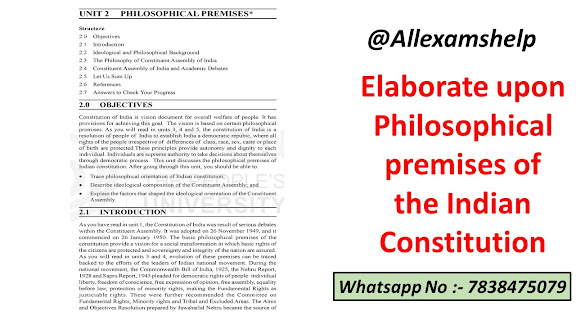The Indian Constitution is a product of a profound and extensive deliberation by the Constituent Assembly of India, which sought to create a framework for governance that would be both equitable and just for all. The Constitution draws upon a range of philosophical and ideological sources, including Indian traditional knowledge systems, modern liberal and democratic ideals, and socialist principles. Here are some of the philosophical premises of the Indian Constitution:
Elaborate upon
Philosophical premises of the Indian Constitution
Dharma: Dharma
is a central concept in Indian philosophy, which means the right way of living,
acting, and being. The Constitution draws upon this concept to establish the
principles of justice, equality, and fraternity, which are central to its
preamble. The Constitution seeks to promote the dharma of social and economic
equality by guaranteeing equal opportunities and equal protection under the law
to all citizens.
Secularism: The
Indian Constitution is founded on the principle of secularism, which means that
the state does not endorse or promote any particular religion. The Constitution
guarantees the freedom of religion to all citizens and prohibits discrimination
on the basis of religion.
Socialism: The
Indian Constitution embodies the principles of socialism, which seek to
establish a more equitable distribution of wealth and resources. The
Constitution includes provisions for the nationalization of industries and the
redistribution of land, and it seeks to promote the welfare of the weaker
sections of society.
Humanism: The
Indian Constitution is founded on the principle of humanism, which places the
human being at the center of its concerns. The Constitution seeks to promote
the dignity and worth of every individual and to protect the fundamental rights
of all citizens.
Democracy: The
Indian Constitution is based on the principle of democracy, which means that
the people have the right to choose their own leaders and participate in the
governance of the country. The Constitution includes provisions for free and
fair elections, the separation of powers, and the independence of the
judiciary.
Overall, the
Indian Constitution draws upon a range of philosophical and ideological sources
to establish a framework for governance that is just, equitable, and
democratic. Its philosophical premises reflect a commitment to the values of
social and economic equality, secularism, humanism, and democracy, which are
central to the Indian national identity.
Philosophical
premises refer to the fundamental assumptions and beliefs upon which
philosophical arguments are built. These premises are the starting points from
which philosophers reason and argue about the nature of reality, the meaning of
life, and the purpose of existence. Philosophical premises are often used to
support or justify certain conclusions or beliefs, and they can be explicit or
implicit.
One important
aspect of philosophical premises is that they are often controversial and
subject to debate. Philosophers may disagree on what constitutes a valid
premise, or they may have different interpretations of the same premise. For
example, some philosophers might view human nature as inherently good, while
others might see it as fundamentally flawed.
Another key
aspect of philosophical premises is that they are often not immediately
verifiable through empirical evidence or scientific methods. Instead,
philosophical premises often rely on logical reasoning and intuition. For
example, the premise that "all men are mortal" is not something that
can be directly observed or tested, but it is a necessary assumption for many
philosophical arguments.
For SOLVED PDF & Handwritten
WhatsApp No :- 7838475019
Philosophical
premises can also be categorized into different types. For example, there are
metaphysical premises that deal with the nature of reality, epistemological
premises that concern the nature of knowledge and truth, and ethical premises
that deal with moral values and principles.
Ultimately,
philosophical premises are the building blocks of philosophical arguments, and
they form the basis for our understanding of the world and our place in it. By
critically examining these premises, we can better understand the philosophical
arguments that follow from them and engage in thoughtful discussions and
debates about the most fundamental questions of human existence.
